Map reveals Alaskan ‘hotspots’ of extreme warming
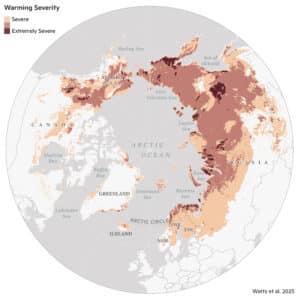
Some of the regions changing the fastest due to climate change are in the far north of the U.S. and Canada.
According to a new paper in the journal Geophysical Research Letters, the fastest-changing areas are dotted around Alaska, Canada’s Northwest Territories, and Siberia.
20 of the most vulnerable hot spots were home to permafrost, which is rapidly thawing around the Arctic, with others being boreal forests.a
Why more frequent cold blasts could be coming from global warming
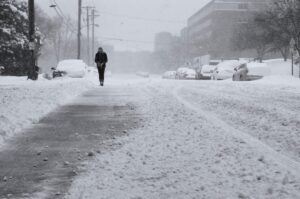
Frigid air that normally stays trapped in the Arctic has escaped, plunging deep into the United States for an extended visit that is expected to provoke teeth-chattering but not be record-shattering.
It’s a cold air outbreak that some experts say is happening more frequently, and paradoxically, because of a warming world. Such cold air blasts have become known as the polar vortex. It’s a long-established weather term that’s become mainstream as its technical meaning changed a bit on the way.
A year of extreme weather that challenged billions
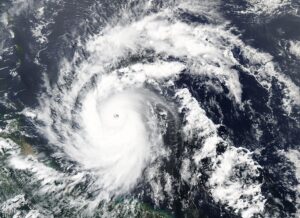
Climate change has brought record-breaking heat this year, and with it extreme weather, from hurricanes to month-long droughts.
This year is expected to be the hottest on record, and new research shows that people around the world experienced an additional 41 days of dangerous heat due to climate change.
Researchers from the World Weather Attribution (WWA) group at Imperial College and Climate Central said the study shows “we are living in a dangerous new era”.
From Brazil to Indonesia we take a look back at the climate events that affected the lives of billions in 2024.
Communicating science
Scientific research is essential to almost all aspects of life- yet we’re in an age when scientists and their findings are met with contempt, distrust and even anger. We hear how this impacts scientists professionally and personally, and discuss strategies for repairing the relationship between science and the public.
With us:
Anne Toomey, associate professor of environmental studies and science at Pace University. She’s the author of the new book Science with Impact- How to Engage People, Change Practice, and Influence Policy
Heather Goldstone, Chief Communications Officer at Woodwell Climate Research Center
Chris Gloninger, Senior Climate Scientist at the Woods Hole Group.
The state of the Arctic: High temperatures, melting ice, fires and unprecedented emissions
The Arctic tundra has switched from a carbon sink to a source of emissions, according to a NOAA report.
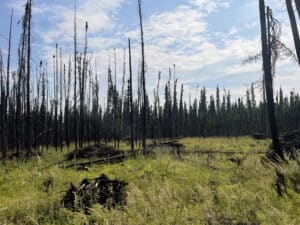
The Arctic just experienced its second-hottest year on record. And concerningly, the region’s tundra has transitioned from being a sink for carbon to a source of emissions as permafrost thaws, releasing carbon dioxide and methane.
That will only amplify the amount of heat-trapping gases that enter the atmosphere, paving the way for further warming.
Second-warmest November on record means that 2024 is likely to be Earth’s hottest year, report says

Earth just experienced its second-warmest November on record — second only to 2023 — making it all but certain that 2024 will end as the hottest year ever measured, according to a report Monday by European climate service Copernicus.
Last year was the hottest on record due to human-caused climate change coupled with the effects of an El Nino. But after this summer registered as the hottest on record — Phoenix sweltered through 113 consecutive days with a high temperature of at least 100 degrees Fahrenheit (37.7 Celsius) — scientists were anticipating that 2024 would set a new annual record as well.
Continue reading on AP News.
Some of the world’s biggest cities are so polluted they’re warming slower
But this surprising effect of pollution should hardly be taken as a good sign.
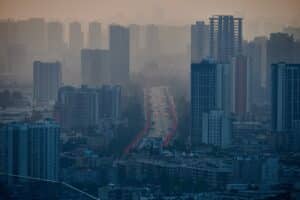
The question of whether global warming is accelerating is hotly contested among climate scientists. While some have argued that the current rate of warming — which hit an all-time high last year — is strictly correlated with increased fossil fuel emissions and therefore aligned with current climate models, others have cautioned that the Earth is far more sensitive to fossil fuels than previously thought and that humanity is hurtling toward tipping points from which there can be no return.
A winter weather puzzle is raising the risk of meteoric energy inflation
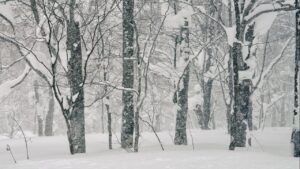
A winter forecasting enigma is poised to send prices for energy and food on a bumpy ride in the next few months, with commodities from natural gas to wheat at risk of breakneck gains against a backdrop of geopolitical turmoil.
Earlier in the year, meteorologists expected this December, January and February to be dominated by the La Niña climate pattern, which influences the world’s weather in specific ways. But La Niña has yet to arrive, and if it does, it will probably be weak. That makes the outlook for the northern hemisphere’s winter much more uncertain.




